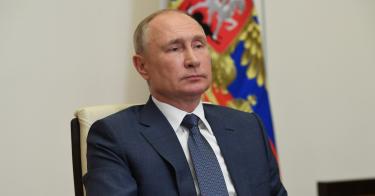While conventional military conflicts between large powers appear to be out of fashion—along with formal declarations of war—Russia has been waging a silent, “hybrid war” against the U.S. for years. Russian President Vladimir Putin’s goal: to influence American minds.
Christopher Krebs, the recently fired director of the U.S. Cybersecurity and Infrastructure Security Agency (CISA), stated after Election Day that there was “no evidence any foreign adversary was capable of preventing Americans from voting or changing vote tallies.” He missed the point. The real issue is not that our enemies are trying to prevent Americans from voting—though that is certainly of concern. Putin is less likely to revel in a victory by either presidential candidate than to celebrate the fact that election results are being disputed in many states, with legal challenges brought before judges for resolution.
Based on 2016 evidence, Russian attempts to interfere with voter-registration lists and to promote voter fraud cannot be discounted. But in the 2020 presidential election, Putin’s primary aim was neither to hurt Biden, nor to aid Trump. We can ascertain today that his primary goal was to polarize the country, and to sow distrust and social chaos to undermine the confidence of Americans in each other and in their democratic process. A polarized, disunited America will help Putin end American dominance of a unipolar world and reestablish Russia as a global power. Russian operatives have been using old Soviet strategies to exploit racial division and stir protests in the U.S. by peddling disinformation about America’s racial injustices. The Kremlin has been successful in infiltrating, for example, both white nationalist and Black Lives Matter groups. Within such groups, Russia pushes inflammatory rhetoric, causing many Republicans and Democrats to question the fundamental structure of and confidence in their democratic institutions.
The response from the Justice Department and U.S. law-enforcement officials has been narrow in scope; thus far, it’s amounted to imposing sanctions on four known Russian agents for their alleged election-tampering efforts, and charging an employee of a Russian troll factory known as the “Internet Research Agency” with “criminal conspiracy to defraud the United States” (related to election influence). These cases notwithstanding, Putin is clearly winning Russia’s hybrid war against the U.S. because Americans don’t understand how they are being manipulated.
One of the main difficulties in countering malign Russian influence stems from divergent understandings of hybrid warfare. Russia considers hybrid warfare a form of conflict which includes strategic uses of economic, diplomatic, and influence operations, along with the use of military forces and espionage. By contrast, the U.S thinks of hybrid warfare as actions or tactics used before a conventional war. While the U.S. thinks it is managing pre-conflict aggression, Russia already considers itself in the midst of a strategic battle disguised as competitive aggression.
Since the 2016 elections, America’s intelligence agencies have repeatedly warned about the threats to American elections posed by foreign states such as Russia. A 2017 Intelligence Community Assessment highlighted the efforts of foreign states who try to “shift U.S. policies, increase discord . . . and undermine the American people’s confidence in the democratic process.” In 2018, NBC News reported that U.S. intelligence had substantial evidence that Russian-backed operatives successfully targeted voter-registration systems in all 50 states prior to the 2016 election. More recently, Bill Evanina, who directs the National Counterintelligence and Security Center, revealed that Russia used various methods to “denigrate former Vice President Biden.” The FBI and CISA also warned of foreign disinformation prior to recent elections, and U.S. intelligence agencies pointed to Russia, China, and Iran as the primary culprits in these malicious efforts.
Washington needs to be clear-eyed about the Kremlin’s hybrid warfare operations, and must begin to anticipate Putin’s intentions and identify ways to defend U.S. vulnerabilities. Additionally, the U.S. needs to counter Russian cyberattacks and dissemination of fake news globally. The U.S. should confront Russia with evidence of their malign behavior, and significantly increase information-sharing with friends and allies. This includes working closely with the EU’s Special Committee on Foreign Interference and the European External Action Service, and assisting with the establishment a new specialized and coordinated agency for countering Russian disinformation. Former Defense secretary Mark Esper correctly noted that winning cyberspace requires an offensive strategy: The U.S. should not shy away from employing its offensive cyber capabilities against Russia. Cost-benefit analyses seem to indicate that the Kremlin recoils—or is routed—when Washington pushes back. The U.S.’s covert cyberattack against Russia’s Internet Research Agency in 2018 during U.S. midterm elections is a perfect case in point.
The most significant step Washington can take, however, is to raise the level of international awareness concerning Russia’s relentless use of disinformation to manipulate open societies. Putin’s nefarious actions thrive on silence, and the current, muted international discourse on the matter represents a victory for the Kremlin. If Russia considers such meddling an act of “hybrid war” on its own terms, the U.S. would do well to address these efforts with commensurate vigor by calling out Russian disinformation publicly and taking retaliatory actions whenever possible.
This piece originally appeared in the National Review



